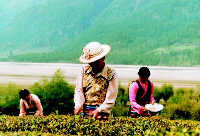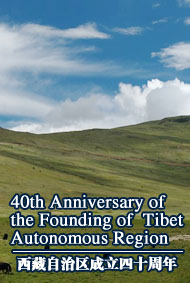|
Tibetan Tea Culture
( 2005-10-27 )
 The local habit of drinking tea has to do with the local food composition. The Tibetans eat lots of yak and goat meat. The strong buttered tea not only helps to keep the body warm but also helps to promote the digestion of the meat that is taken almost three meals a day, 365 days a year. The local habit of drinking tea has to do with the local food composition. The Tibetans eat lots of yak and goat meat. The strong buttered tea not only helps to keep the body warm but also helps to promote the digestion of the meat that is taken almost three meals a day, 365 days a year.
Local sayings go that the others cannot do without salt whereas the Tibetans cannot do without either salt or tea.
 Tea to Lamas Tea to Lamas
All Tibetans, including lamas, consider tea essential.
Every morning, lamas attend a morning mass held under the auspices of the sutra teacher. This is followed the consumption of buttered tea and a roasted highland barley dish known as tsamba.
At noon, they gather in the sutra hall of the Buddhist school of the monastery to pray and recite Buddhist scriptures while drinking tea. This ceremony is much the same as the morning Mass, but is held on a smaller scale.
In the evening, lamas gather in Khang-tshan organized according to where they are located to pray and drink tea in a fairly informal setting (kamqa in Tibetan).
It is very common for benefactors to visit monasteries, where they offer tea porridge to lamas while presenting them with the titles of the Buddhist scriptures they wish the lamas to recite for them. There are also senior lamas studying for Geshi (a Buddhist academic degree equivalent to a PhD) who also offer tea porridge to the lamas of the whole monastery.
 Two kinds of tea Two kinds of tea
Buttered Tea
Buttered tea is an indispensable part of Tibetan life. Before work, a Tibetan will drink several bowlfuls of this tangy beverage. The tea is also always served to guests.
To prepare buttered tea, a little freshly-brewed brick tea with the tea leaves removed, a lump of butter, and a pinch of salt are put into the wooden "tea churn" with some boiling water and then churned for a minute or so until the tea is well mixed. The resulting liquid is poured into a kettle, heated, and then served. Tea churning is a daily ritual. When prepared, the tea is transferred to a kettle to be kept warm over the fire.
|

